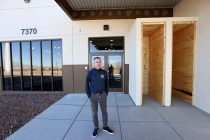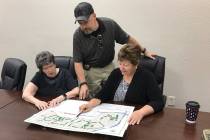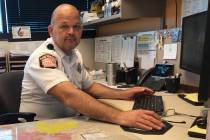Scams target ‘responsible’ members of society of all ages
Picture this fictionalized scenario: It’s early evening. Your wife drove to the grocery for a container of milk for breakfast. Now she’s driving home on a dark and quiet road. The only other car in sight is a safe distance in front of her. Suddenly, a third car comes out of nowhere and cuts off the driver in front of your wife, which causes him to stomp on his brakes. Your wife can’t react in time and rear ends the car in front of her. The cut-off car races away and is gone into the night.
There are four people in the car that was hit. Your wife hit the car, so she’s at fault. All four are witnesses. All four are also claimants. Was the whole thing a setup by the other two drivers to whack your insurance company on a claim for property damage? What about whiplash, sore backs — you name it — provided the foursome goes to the right doctor and the right lawyer?
The name for this little game that’s being played out with greater frequency is “staged accidents,” one of the many auto-related fraudulent schemes that are becoming popular, especially in middle-class communities such as Summerlin, where most motorists carry sufficient amounts of auto insurance.
You had to hear Henderson’s Terry Hulse talk about it, as I did recently when an audience of the Residents’ Forum in Sun City Summerlin gathered to learn about growing incidents of fraud — all kinds of fraud. And it’s not just the seniors who live in Sun City who are being victimized.
“It can be any responsible individual,” said Hulse, a special agent for the National Insurance Crime Bureau.
It can also be anyone who provides personal information that is innocently requested and then disposed of in a reckless manner once it has become computerized.
For example, you go to a doctor’s office and fill out the forms that request more than just your medical history. You write down your Social Security number, your spouse’s Social Security number, addresses, phone numbers, dates of birth, names and addresses of employers, your driver’s license number and a variety of other pieces of personal data, as well as information about your next of kin. You are asked to provide credit card information and the names and addresses of health insurance companies.
Much of this is understandable. Doctors’ offices need lots of information. And eventually clerks in those offices computerize these reams of data.
But then what do they do with all that paper you filled out? Well, Kathy Perkins, a crime prevention specialist at the Las Vegas Metropolitan Police Department’s Northwest Area Command, 9850 W. Cheyenne Ave., explained that in some cases, you might find out by walking to the rear of the medical building and finding a big dumpster. And in it might sit a Comstock Lode of information for crooks bent on stealing the identities of individuals.
“After they’ve computerized your forms, they dispose of the paper. What else would you expect them to do with it?” Perkins said.
Of course, in many cases, the forms are shredded. But in other cases, they’re not.
“That’s a lot of paper with personal ID,” Perkins said.
Perkins also delved into the dangers of investment fraud while appearing on the same Residents’ Forum program, as did a group of officers led by Morgan Green from Chase Bank in Sun City. They provided state and federal phone numbers and other hints to help consumers check the background of some fast talker who has an investment that sounds too good to be true.
An interesting booklet distributed during the program, “Fighting Fraud 101,” was produced by the Financial Industry Regulatory Authority, “an independent regulatory organization empowered by the federal government to ensure that America’s 90 million investors are protected.”
The booklet explained how research “has shattered the stereotype of investment fraud victims as isolated, frail and gullible.”
It talks about the individual who, among other things, is “self reliant when it comes to making decisions, optimistic, above-average financial knowledge, above-average income, college-educated …”
The authority goes on to say that if you know such an individual, then “you know someone who fits the profile of an investment fraudster’s prime target.”
You can contact the authority by calling 800-289-9999.
Herb Jaffe was an op-ed columnist and investigative reporter for most of his 39 years at the Star-Ledger of Newark, N.J. His most recent novel, “Double Play,” is now available. Contact him at hjaffe@cox.net.

















